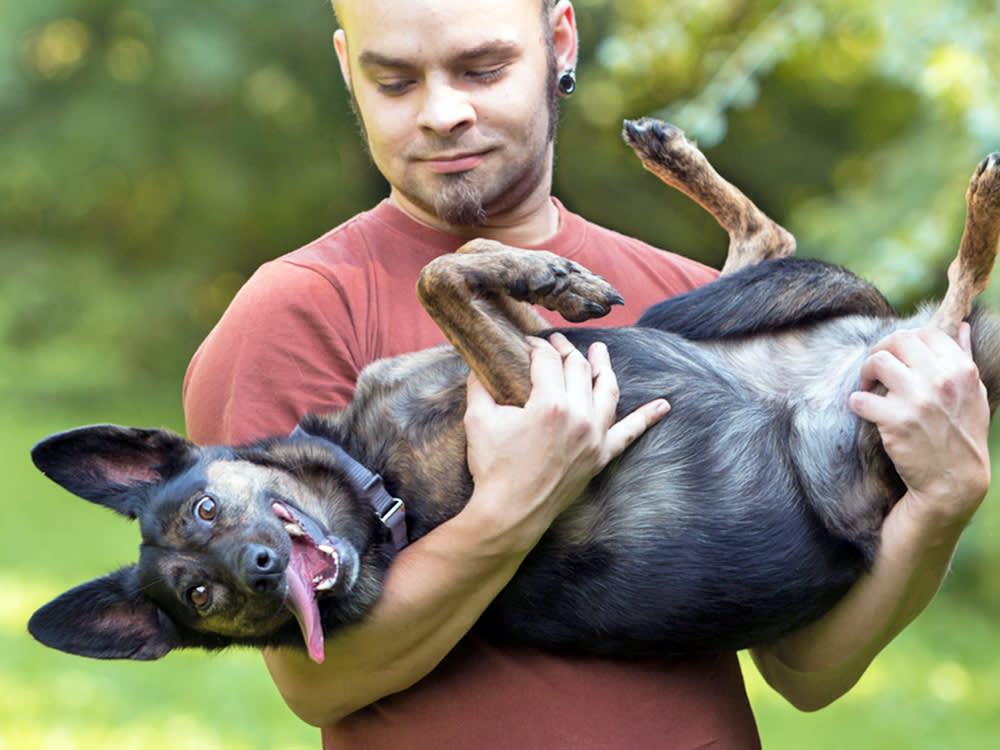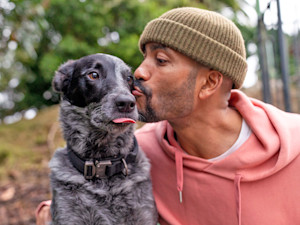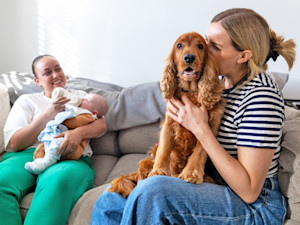Are Dogs Really Just Permanent Toddlers?
We’ve all heard the comparison.

Share Article
It isn’t hard to understand why so many people liken dogs to human toddlers. They both have big, round eyes. They both smell a little funny after playtime in the backyard. And most importantly, they’re both cute enough to make us want to smush them with endless hugs. But like any comparison, this one invites a natural question: how accurate is it, really?
Unlike so much conventional wisdom, there actually is some truth to this. Past research has suggested that dogs’ mental abilitiesopens in new tab and social intelligenceopens in new tab are on par with human toddlers. Some vets, like Pumpkin Pet Insurance veterinary expert Dr. Mondrian Contreras, make the comparison to help pet parents better understand what’s going on with their pups.
At the same time, Dr. Contreras says, it’s also an oversimplification to say that adult dogs are just like human two- and three-year-olds. “There are grains of truth in certain comparisons,” Dr. Contreras says, “but it’s not at all an accurate descriptor of dogs’ cognitive and sensory abilities or emotionality over the course of their life.”
Read on to learn more about what our pups have in common with human tykes — and where the analogy falls apart.

Do dogs really think like toddlers?
Like so many questions about the doggie mind, it’s hard to say anything for sure. After all, we can’t sit our pups down for tea and dig into their life philosophies.
Still, Dr. Preston Turano, a veterinary expert with ASPCA Pet Health Insuranceopens in new tab, finds it “hard to believe” that dogs never progress beyond a toddler’s understanding. After all, he says, service dogs must undergo extensive training and build considerable amounts of trust. Plus, “there are many other examples of working breeds that form complex relationships and understanding with their pet parents.”
A 2017 studyopens in new tab found that dogs’ cooperative communication skills outperformed that of chimpanzees, placing their achievement in the same range as two-year-old human children. And as Dr. Contreras notes, toddlers and puppies “are both very dependent on their caregivers and learn through trial and error, social cues, routine, and benefit from structure, positive reinforcement, repetition, and language cues.”
Still, Dr. Contreras says, there are “stark” cognitive differences between dogs and toddlers as well. “We underestimate dogs’ capacity to learn self-control, understand nuances of different households, and learn about consequences that occur from experience,” he explains.
Dogs also have much stronger senses of smell and hearing than even adult humans — which gives them the special ability to pick up on psychological changes we might miss. “Dogs’ acute sense of smell and strong observational skills, for example, allow them to pick up on sweat changes in humans that are linked to fear or breath changes that are linked to stress,” Dr. Contreras says. Toddlers can do a lot of things, but they cannot smell fear (though it certainly seems like that when they’re having a tantrum in the grocery store).
Do dogs handle emotions like toddlers?
As all dog parents know, our pups can form extremely strong bonds. According to Dr. Turano, they can be more complex than those shared by toddlers.
“We know that dogs experience many different emotions ranging from anxiety, depression, fear, to excitement and joy,” Turano says. “These emotions become even more complex as the human-animal bond develops over time between the pet parent and their dog.”
Dogs can express their feelings in a variety of ways, including through body language, facial expressions, and vocalization — like those adorable “OMG, you’re home!” dances they do every time we walk through the door. Still, Dr. Contreras argues that their emotional complexity is not as diverse as that of a human adult. Although dogs can feel things like happiness and anger, he says, “humans also experience complex emotions like pride and guilt, which dogs do not.”
Because toddlers have not yet fully developed the ability to experience and process those complex emotions, Dr. Contreras says, “in some ways, their emotional capacity is similar to that of dogs.”
So how do dogs think?
OK, so dogs aren’t exactly like human toddlers — even if there is some overlap. So, what’s a better way to understand how they perceive and react to the world?
According to Dr. Turano, our pooches largely use their senses to navigate their environments, and because their senses of smell and hearing are so sharp, they rely on them more than we do. “They use their eyes to read body language and navigate their surroundings,” Dr. Turano says. “They put all of it together with a high focus on the present moment.” Sounds very Zen.
In addition to using their eyes, noses, and ears to stay grounded in the now, Dr. Contreras adds that dogs depend on associative learning to help them anticipate outcomes from repeated experiences. “With regard to problem-solving, for example, dogs can learn to obtain a treat by repeatedly watching their owner push a button and getting a reward,” Dr. Contreras says. That’s associative learning in a nutshell — “causal reasoning with a limited domain, and frustration when the situation eludes them.”
One thing we have in common? “Dogs love positive reinforcement and a routine,” Dr. Turano says, “not unlike most humans.”

Laura Bradley
Laura is a New York-based experienced writer and mom of two rescue pups. Her work has appeared in Slate, Vanity Fair, Daily Beast, The Washington Post, The Atlantic, Yahoo! News, Vulture, Grazia Magazine, and more. When she is not writing or walking the pooches, you will probably find her in the community garden.
Related articles
![Man kissing his black and white dog outside in the woods.]()
Younger People Are More Likely to View Their Pets as Children, New Study Finds
Bring out the puppy strollers.
![A woman kissing her dog on a couch.]()
Millennials Are Choosing Pets Over Kids, Study Finds
A study found that millennials are choosing pets over kids. Here’s why.
![an illustration of a couple kissing, a dog, a couple holding hands, a child, and a child playing with a dog]()
Is Raising a Dog With Someone Anything Like Raising a Kid Together?
It’s the great puppy versus baby debate.
![Two friends hanging out with their baby and dog at home.]()
Are Dog Moms ‘Real’ Moms? Not Everyone Thinks So
Even as more people choose to have pets over kids, they are often still met with criticism.
![Woman sitting with her dog outdoors]()
How to Talk to Your Dog, According to Science
Baby talk works on puppies. As for adult dogs, that’s still up for debate.






